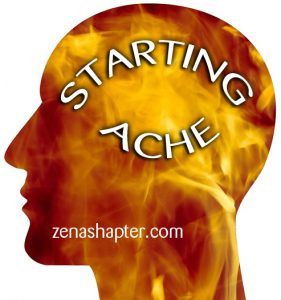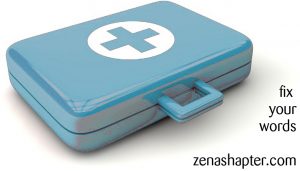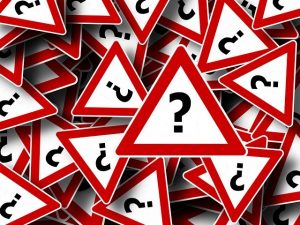
You have a good idea for a story, but don’t know how or where to start? Maybe you’d like to create a book, short story, life story or memoir? Even seasoned writers can struggle with the question of how to start. As well as writing amazing stories (he he!), I run a full-time creative support business. It includes editing, mentoring, teaching, book layouts, and other publishing and creative support for authors and publishers. I’ve recently seen so many clients so utterly stuck with this question, it’s time to speak up and add to my ‘Writing Rockface’ collection of advice. Other blogs in this series include:
Definition
The Starting Ache is a painful sensation caused by being unable to start a writing project. Writing is a process consisting of:
- Concept creation
- Drafting – beginning, middle and end
- Structural revision
- Editing
- Testing
- Polishing
- Publication
‘Starting’ involves the first two of these steps: concept creation and drafting.

Symptoms
If affected with Starting Ache, you’re likely to be plagued by confusion about how to start writing, thus risk remaining full of ideas without any external expression of them and grumpy with it. Not creating something you clearly yearn to create can also affect unconnected aspects of your life. You may experience feelings of disappointment, failure, and low self-esteem. You are likely to develop an unfulfilled sensation, with ideas and frustration building up inside your brain until you eventually explode. If you do write opening paragraphs or pages, you are likely to delete them.
Causes
The most obvious cause of Starting Ache is a simple lack of knowledge. Unless you know the options, how can you know which approach is right for you? Conversely, perhaps you already think you know how to start, yet when you do, it doesn’t sound right or flow as you expected?
Starting Ache can also be caused by fear – in particular the fear of not doing well. Last week I had a client who was completely blocked because they feared not being good enough. They were a perfectionist. If a sentence wasn’t right, it had to go. The problem was, this was every sentence. Fear can lead to a paralysing feeling of being overwhelmed with the task ahead.
Finally, time can be an issue with Starting Ache. When will you have time to actually start? Unfortunately the number of hours in the day are limited, so you might have to sacrifice something else to make room for your creation process. If you want something enough, with a little re-prioritisation, there are ways to make it happen!
Luckily, as soon as most of my clients understand that they won’t have a manuscript to edit unless they somehow overcome Starting Ache, they usually find a way to get going, or seek out one-on-one help to talk it all through.

Treatment
There are five ways to overcome Starting Ache.
Character Experience
Stories are about change through challenge.
For example, if Zena wants chocolate but there’s none in the cupboard, and so she goes to the shop, buys and eats some – there’s no challenge in the story and it isn’t worth telling. If, however, she faces a series of interesting challenges on her way to the chocolate (even better, challenges that change her perspective in some way) that could be a story worth telling. The first way to start writing a story is therefore to consider the experience and insight of your main character(s):

- what they want (‘external’ goal)
- why they want it (motivation, drive, often subconsciously based on an old ‘wound’)
- how much they want it (stakes)
- what they really need (often subconscious ‘internal’ desire they really need, hidden under some ‘lie’ they told themselves after the ‘wound’)
- what challenges they might face trying to get what they want and need (conflict)
All of these elements should be personal to your character in particular – stakes don’t have to be world-threatening to matter, they only have to matter to your character. A good way to think this through is to consider what matters to you – because generally, if it matters to you, it will matter to readers too.
How to start writing: write about what your character is doing today, given all of the above.
Plot Escape
Stories are about escaping into interesting events.
For example, if Zena wants chocolate, then watches a health program that changes her perspective on nutrition, so she decides not to buy anymore (noooooo!), there is change in the story but no actual movement – it’s not an interesting enough event for a story. If Zena watches that program, however, and it reminds her of a time when a friend ate too much chocolate and was sick – we at least have movement in that event recollection; it might make an interesting ‘flashback’.

Plot is the sequence of events that make up a story, where each event affects the next one through the principle of cause-and-effect. Readers want to be taken on a journey actually travelled by another. So the second way to start writing a story is to consider what will actually happen in it.
- What events will happen in the story’s beginning?
- What events will happen in the story’s middle, connected to the beginning?
- What events will happen at the story’s end, connected to the preceding events?
You could plot out the main events, or even a full synopsis of your story. Once you have determine that connected sequence of events, you can then think how those events affect your characters. Which characters are most affected by your events? Whose story is this, who changes the most because of those events?
How to start writing: write a summary of your story’s plot.
Theme Connection
Stories are about connecting with readers over a central message.
What do you want to say with your story? What point are you trying to make? Why even write about Zena wanting chocolate – do you mean to comment on gluttony, self-discipline, the power of memories? The third way to start writing a story is to consider what larger thematic issue you want to explore with your story:
- pick a theme you care about
- what question(s) do you want to ask about that theme?
- how could your story put those questions to the test?
A good way to explore theme is to:
- create characters who don’t yet understand or agree with your view on the theme
- devise related obstacles in the plot for those characters to overcome
- have your characters progress towards a thematic revelation that illustrates your point
How to start writing: write out your views on a thematic issue that could form the basis of a story.
Nothing
Stories are about imagination and self-expression.

Set your mind free to dream and create, and who knows where it might take you! Where might it take Zena’s problem with the chocolate-less cupboard – to another country, another planet? Who might she meet along the way? The fourth way to start writing a story is to simply start writing and see where it takes you.
Rather than plan out a character, plot or theme (called being a planner), just sit in front of a blank page and write ‘by the seat of your pants’ (called being a pantser):
- abandon the confines of planning and simply find out what comes alive when you start to write
- enjoy the surprise of not knowing what might then follow
- experience the story as your characters live their lives in real time, unable to predict the future
You don’t even have to start at the beginning of a story. You might find that what you write turns out to be the story’s middle or end. That’s fine, you can always write the beginning later, after you know where the story is going, who’s in it, and how best to hook the reader. By writing without a plan, your characters can develop and your plot can grow in ways you didn’t expect! Writing your story can be as much of a journey of discovery as reading is for the reader.
How to start writing: make up the story as you go!
Everything
Stories are about creation.
The process can be invigorating and thrilling; it can also be complex and frustrating. As you develop your work you may encounter problems that need fixing. Perhaps you started writing with a specific plan in mind, alternatively you winged it direct from your imagination, but now it simply doesn’t work on the page – essentially all you have is a story about Zena wanting chocolate, and it isn’t enough? Finding the best way to fix the problem is part of the fun! Every story is different, so you’ll need different solutions, and different ways to start writing each one. Whichever method you used to start your story, review the options above and try again with a different method.
How to start writing: Experiment!
Exceptions

You don’t have to write a story! You could ‘start’ by writing a:
- vignette (a brief evocative description or account)
- diary entry
- blog post
- letter or email to a friend
Make them interesting enough and write enough of them, and they might end up being a different kind of story altogether.
Exercise:
Just start writing!

- Go to your bookshelves or open any webpage and write down the first sentence you see – use that as an opening line to a story, and just start writing!
- Sit somewhere interesting, reflect on your surroundings, and just start writing!
- Consider the most dramatic events that happened this week, month or year, and just start writing!
- Recollect a recent experience you found challenging, and just start writing!
Questions?
Do you struggle with how or where to start writing? Do you have any exceptions to share? Let me know in the comments below! Need any writing help? Send me a message!
To come:
- The Continue Condition
- The Finish Fright






Pingback: Writing Rockface: The Continue Condition – Zena Shapter
Pingback: Writing Rockface: The Finish Fright – Zena Shapter